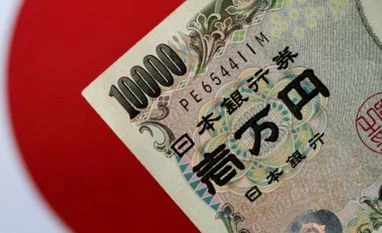The dollar index slipped on Monday and the yen hit new five-year lows as global markets experienced some re-emergence of risk appetite and investors braced for central bank meetings this week in the United States, Britain and Japan.
After uncertainty about the war in Ukraine prompted a market sell-off on Friday, stock markets rebounded on Monday and commodity prices edged back down.
Analysts attributed the revival of risk appetite to the fact that Russian and Ukrainian negotiators hinted at progress in peace talks.
The dollar index rose during Asian trading, coming close to a 22-month high as the rate-sensitive short-term U.S. Treasury yields rose, but it then edged lower as European markets opened and was down 0.1% on the day at 98.9 at 1255 GMT.
"We've seen a slightly more risk-orientated start to the week, although that risk appetite and that optimism is dissipating and so I think the flight to safety in terms of dollars will generally remain in play," said Jeremy Stretch, head of G10 FX strategy at CIBC Capital Markets.
Currency markets were also driven by expectations that the U.S. Federal Reserve will raise rates at its meeting this week, which ends on Wednesday.
Also Read
Investors were pricing in a 93% chance of a 25 basis point hike.
Federal Reserve Chairman Jerome Powell last week flagged multiple interest rate increases this year.
The U.S. dollar hit a five-year high against the Japanese yen overnight, at 118.06, as investors bet that the Bank of Japan, which meets on Friday, would maintain its dovish stance despite rising inflationary pressures.
With the divergent policy expectations between the Fed and BoJ, the spread between U.S. and Japanese government bonds widened - a development that CIBC's Stretch called "a good leading indicator for dollar outperformance versus the yen."
"Japanese investors will be looking at that yield differential and seeing there is an opportunity to try and benefit from investing in high-yielding Treasury paper," Stretch said.
ING FX strategists said that the yen was also losing out due to the impact of higher fuel prices on Japan's trade balance.
The British pound was still near a 16-month low, up 0.2% on the day, ahead of the Bank of England meeting on Thursday.
The euro was up 0.5% at $1.09545.
The Australian dollar was down 0.6%, hurt by the easing of commodity prices, while the New Zealand dollar was down 0.1%.
The yuan weakened amid lockdown measures to limit the spread of COVID-19 in China.
The dollar hit 6.3828 versus the offshore yuan, the yuan's weakest in more than a month.
China has reported more local symptomatic COVID-19 cases so far this year than it recorded in all of 2021, as the highly transmissible Omicron variant triggers outbreaks from Shanghai to Shenzhen.
"The Chinese yuan has started to feel the weakening pressure due to continuous bad news for the economy," Commerzbank senior economist Hao Zhou wrote in a client note. "China is also facing intensifying pressure from the West to clarify its stance on the Ukraine war."
(Reporting by Elizabeth Howcroft; Editing by Raissa Kasolowsky and Will Dunham)
(Only the headline and picture of this report may have been reworked by the Business Standard staff; the rest of the content is auto-generated from a syndicated feed.)



)